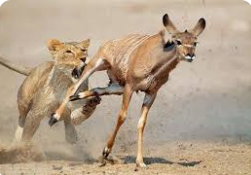Many of us will be familiar with the African adage that “Every morning an impala wakes up knowing that it must outrun the fastest lion if it wants to stay alive. Every morning a lion wakes up knowing that it must outrun the slowest impala or it will starve. It makes no difference if you are a lion or an impala; when the sun comes up in Africa you must wake up running.”
The maxim does offer us an insight into competition; after all, the lion and the impala are competing against each other with the prize being the priceless gift of life. It may not be a particularly fair competition, nor will it have been one that the impala freely entered, but it is a competition nevertheless – a lion versus an impala. It is, after all, the Law of the Jungle, where it comes down to the survival of the fittest, or perhaps the survival of the fastest. It is a matter of the last impala standing wins (for a while, at least). The lion and impala run to stay alive; their aim is to survive.
In sporting terms, if we look at the English Premier League, it is often noted that the winners of the league are going to come from one of six teams. That means that the majority of the teams in the league are actually simply fighting for their survival in the Premier League, season after season. They are never likely to win the Premier League (although Leicester City did shake that theory a number of years ago!) and they do not set out to win the league – they plan to do as well as they can but above all survive. Their aim is to be in the Premier League the following season. Their ‘lion’ is relegation (interestingly the logo for the English Premier League is a lion!).
So, competition for many comes down to quite simply being a matter of survival. The name of the game is ‘Last Man Standing’. In this competition, we do not have to come first in everything but we just have to ensure we are still in the game when the whistle blows. We see such a competition in cycling with the Elimination Races whereby at the end of each lap the last rider drops out. We just have to make sure that we are not the last rider, that the ‘lion’ does not take us out. Similarly, in training, when we undergo the Beep Test, we do not have to be the first one to reach the targets – we just need to pace ourselves to ensure we meet the target with the minimum of effort and the most reserve of energy, so that we can survive longer. Pushing ourselves to come first in early stages may well work against us in the long run; it may well jeopardise our survival chances.
Children may need such an approach to life in the competitive world in which they will move; some will be impalas while others will be lions. Both see life as a matter of survival. A pupil might approach his school work in a similar vein, just making sure he does enough to get by, to pass, to be able to say he beat others, without too much stress or effort. A sports team may simply look to do enough for them to win the match. The winner of the high jump is simply the last one to fail, the one who survives the longest. However, such an approach is not much good if we do not beat others. The survival instinct, though, is pretty strong.
Competition teaches children many crucial lessons – and one very important reason why we teach competitiveness is that they have to learn to compete or else they will fall by the wayside. When the sun comes up each day, our children must wake up competing. Sadly, if they do not, someone is going to lose out somewhere along the way. It comes down to the simple equation: Beat ‘em or b’ eaten. There is very little difference between the two alternatives (in spelling and in reality) but it does come down to this stark choice. We are all in the business, first of all, of surviving.
A number of years ago there was a wonderful advert for a particular brand of running shoes. In the advert, two men were walking barefoot in the African bush discussing life when they suddenly came across a lion standing in front of them. They stood very still and pondered very carefully their next move. After a few moments of such reflection, very quietly, very carefully, very slowly, one of the men took a pair of running shoes out of his bag and put them on, at which point the other one in a hushed voice asked him mockingly if he really thought that the shoes would make him run faster than the lion. “No,” said the first one, “But they will make me run faster than you.” Survival was all that mattered. Such is the way of competition – even lions know and understand that!




